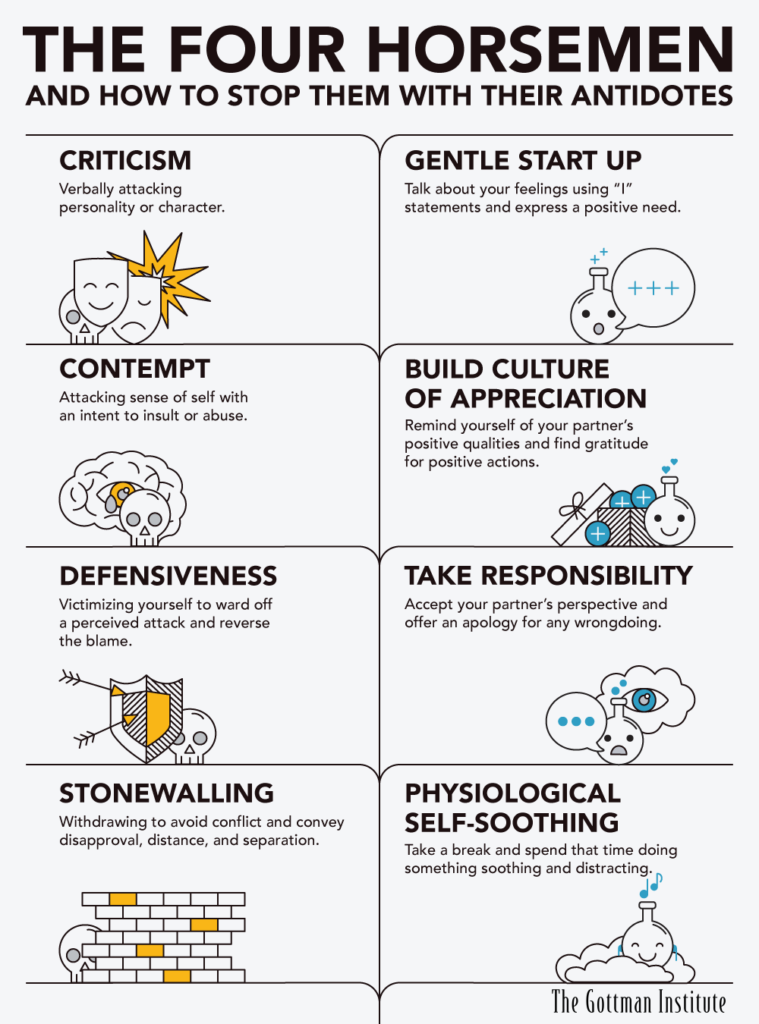
57 – Navigating Conflict During COVID-19 with Carmen Okhmatovski
- Carmen Okhmatovski
Subscribe: Apple Podcasts | Google Podcasts
Do you and your partner find yourselves struggling with more conflict during this time of COVID?
Many couples find that the dynamics of their relationships have been changed or strained as a they spend more time together, less time with friends and family, and more time working from home or navigating return-to-work with COVID. Times of intense togetherness often intensify our patterns. Sometimes its hard to know what exactly is contributing to the feelings of disconnect, but we just know that our gears are slipping.
Marriage and Family Therapist John Gottman, PhD, has identified four communication/behavior patterns that are the main contributors to conflict and feelings of disconnect. He calls them the Four Horsemen of the Apocalypse, and they are: Contempt, Defensiveness, Criticism and Stonewalling.
Criticism is a form of personal attack. Rather than critiquing a behaviour or complaining about an outcome, contempt attacks the person themselves. The person on the receiving end of criticism feels assaulted, rejected, and hurt. The antidote to criticism is the “soft or gentle start-up.” Rather than blame or personal attacks, criticism is avoided by using “I statements.” Ask yourself “What do I feel?” And “What do I need?” and share those with your partner. Ex: “I felt really sad when our plan to spend time together fell through last night. Could we spend some time together today, and figure out how to avoid that next time?”
Defensiveness is a way of protecting our ego. It shows up in the form of excuses, deflection, not accepting responsibility, and blame reversal. The purpose of defensiveness is to diffuse conflict, but it has the opposite effect of making the other partner feel unheard or blamed, and thereby escalates conflict. The person on the receiving end of defensiveness feels unheard, and unfairly blamed. The antidote to defensiveness is accepting responsibilityfor ones own behaviours or patterns. Beware the pitfall of “accepting that my partner thinks I’m at fault.” Ex: “You’re right – we were supposed to leave 15 minutes ago, and I know you hate being late, and I don’t really like it either. I’ll make a note to start getting ready 15 minutes earlier.”

Contempt is the number one predictor of divorce and must be avoided at all costs. Contempt is based in a feeling of moral superiority. It is mean, and often shows up in the form of disrespect, mocking, sarcasm, ridicule, eye-rolling, scoffing, disdain, etc. The person on the receiving end of contempt feels despised and worthless. The antidote to contempt is to combat the root of moral superiority. This is done by building a culture of appreciation – gratitude for big and small things. Showing affection and appreciation, and finding things that you can respect about your partner and communicating that about them.
Stonewalling is a common response to contempt, and is a result of psychological flooding. Stonewalling looks like withdrawal, shut down, not responding, tuning out, acting busy, avoidance, and preoccupation with other tasks. The person on the receiving end of stonewalling often feels invisible, alone, or abandoned. The antidote to stonewalling is not allowing the psychological flooding to overtake the conversation. When one feels they are starting to shut down or wanting to retreat, it’s important to stop the discussion respectfully and make a plan to calm oneself, then return to the conversation later. “I’m feeling overwhelmed right now. Can we come back to this in 1/2 hour?” Use the time in between for soothing activities such as reading, bathing, walking, working out, etc. And once calm, you can return to the conversation and continue.

Tune into the podcast to hear more of Carmen’s tips for navigating togetherness during COVID.
If your attempts at reducing conflict using these antidotes don’t seem to help, it may be time to seek help from a professional.
